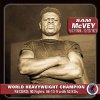At the signal to commence the first round Stevenson threw a somersault across the ring and landed prone. He grasped McVea's ankle... McVea looked as though he could have banged away at any portion of Stevenson's anatomy, but close watchers could observe McVea's ankle gradually being twisted round. Not only could he not hit his opponent, but found It impossible even to stand up. He fell eventually and Stevenson worked his hold right up the body, grabbed the right arm, and McVea tapped.
Stevenson had taken the first round in less than 2 minutes. The next few rounds would follow a similar pattern: Stevenson would work to drag McVea to the ground where he would then gain the submission around the 2 minute mark. In the second round, Stevenson tripped McVea to the ground where they rolled around before "Stevenson got the neck hold and seemed to be in a position in which he could have throttled McVea. McVea tapped once more." In the third, Stevenson fell back and dragged McVea down with him where he secured a "severe arm hold" and "Eventually McVea gave way once more". In the fourth, "Stevenson dropped to the ground and lay there, inviting an attack. McVea lunged at him, and Stevenson grabbed his arm and ragged his opponent down" where he secured a scissors hold on McVea's head, forcing him to surrender yet again.
Now down four rounds to none and on the brink of losing the match, many spectators began to question if McVea was giving it his all. It was obvious that the Professor was doing almost all the hard work: where he was perspiring heavily and breathing hard, McVea looked about as fresh as he did when the match began.The boxer had managed some offense, landing some lefts and uppercuts in rounds two and three, and ramming some hard blows to Stevenson's midsection when trapped in the scissors hold in the fourth, but nothing too meaningful or threatening.
During the bout the work of neither man was received very well. The sporadic applause was always downed by cries of dissatisfaction. However, It appeared to some that McVea missed many occasions when he could easily have despatched his opponent
Some, perhaps more astute, witnesses were more forgiving of McVea's seemingly poor showing.
McVea, however, was justified in being cautious,however,as to be caught off his guard for a second meant defeat against so skillful an exponent of jiu-jitsu.
Whatever criticisms there were of McVea were disregarded in the "sensational" fifth round.
Stevenson easily got hold of McVea's neck. The latter, however, seemed to be prepared for this. He straightened up and swung Stevenson off his feet, and whilst he clung there McVea drove solid blows to tbe stomach They were very sold blows, and they eventually drove Stevenson off. Then M'Vea got to work in earnest, and at long range attacked Stevenson's head. He sent in heavy lefts to the jaw. Three times in succession he sent Stevenson to the boards for four seconds, four seconds, and eight seconds. Stevenson got up very groggy, and McVea went In to finish him. Stevenson, however, dragged his man In agaln, and both fell on the floor. McVea continued to send In solid punches to the body and face. Stevenson turned over, and McVea Immediately drove In three powerful blows to the back of the neck and Stevenson was out.
Stevenson's corner, unable to revive him in time for the next round, decided to throw in the towel. This was met by hooting from the crowd, mostly from Stevenson supporters upset that he was about to be declared the loser even though he was up four rounds to one.
Afterwards, McVea explained his strategy (Stevenson was reported to have not been in any condition to speak to the press): being familiar with jiu-jitsu, he had intentionally been overly cautious, wanting to force the smaller Stevenson to tire himself out while not risking injury himself. Eventually in the fifth round an opening appeared and he took full advantage of it, proving that his strategy had been sound.
Sam McVea never again faced a ju-jitsu exponent, instead focusing the rest of his days on boxing. He ended his Hall of Fame career with a record of 65-16-12 in the sport.
And 2-0 in "all-in".









